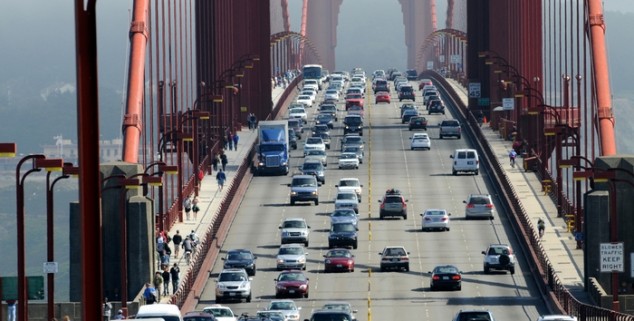News
Amnesty for traffic fines, court fees in Brown’s budget
 As rush hour approaches, traffic on the Golden Gate Bridge. (Photo: Frontpage)
As rush hour approaches, traffic on the Golden Gate Bridge. (Photo: Frontpage)Gov. Jerry Brown, who got nailed for parking in a yellow zone, is pushing an amnesty program for millions of California drivers caught in what he called a “hellhole of desperation” from spiraling legal fines and fees.
“There are not only flat-out fines, there are all these penalties that are added to the fines,” Brown said Thursday as he unveiled his $115 billion state budget for the fiscal year beginning July 1.
“So many local jurisdictions pile on fees for minor traffic violations to make up for lost revenue during the recent economic recession.”
Some 4.2 million California motorists – one in six drivers across the state – have suspended licenses because they can’t afford the fines, according to a recent study. Hardest hit are low-income drivers.
“I remember when I got a ticket on two successive Saturdays for parking in a yellow zone and it was only $40, but I haven’t parked in a yellow zone since. I thought that was a very good deterrent,” Brown said. “So when you get someone who is making $10,000 or $20,000 a year, and you saddle them with four or five hundred dollars, then they don’t pay, then they get a warrant issued and then they lose their license. It’s a hellhole of desperation and I think this amnesty can be a very good thing to both bring in money, to give people a chance to kind of pay at a discount and I think that whole business of the fines ought to be looked at.”
Brown proposed an 18-month amnesty program to allow people with past-due, court-ordered debt owed prior to January 2013 that stems from infractions such as tickets to pay only half of what they owe. Amnesty would be allowed only for non-violent, non-drug offenses. Brown estimated the amnesty program could raise $150 million annually. Three years ago, the Brown administration authorized a similar amnesty period, which has since expired.
Sen. Bob Hertzberg, D-Van Nuys, has authored legislation similar to Brown’s proposal. (Ed’s Note: Click here for Capitol Weekly’s April 9 story on this issue).
Hertzberg’s bill, SB 405, would restore a driver’s license if it was suspended for nonviolent offenses and if the driver agrees to a court-ordered debt collection program. The legislation, SB 405, would work in conjunction with Brown’s proposed Traffic Amnesty Program, which seeks to collect at least some of the estimated $10 billion in uncollected, court-ordered debt.
Hertzberg, in announcing his bill last month, said traffic-court fines and an array of escalating fees and penalties have forced millions of drivers from their automobiles and unable to get to work.
“So many local jurisdictions pile on fees for minor traffic violations to make up for lost revenue during the recent economic recession,” Hertzberg said in a statement released by his office. “This trend makes it even more difficult to find and keep a job. What’s happened is a situation where minor traffic tickets can push a family deep into debt.”
Hertzberg’s office cited a study by the Lawyers Committee for Civil Rights in San Francisco that found that “low-income Californians are being disproportionately impacted by state laws and procedures related to driver’s license suspensions.”
From 2006 to 2013, more than 4.2 million licenses were suspended. During the same period, only about 71,000 driver licenses were reinstated.
“Under existing law, it is virtually impossible for the driver’s license to be restored until all the unpaid fees, fines and assessments are completely paid. This jeopardizes economic stability in the state, limits the available workforce, and forces employers to bear the cost of replacing workers and finding qualified replacement workers with valid licenses,” according to Hertzberg’s office.
The suspensions “make it harder for people to get and keep jobs, harm credit ratings and raise public safety concerns,” the study noted.” Ultimately they keep people in long cycles of poverty that are difficult if not impossible for many to overcome.”
In one example cited in the study, one state resident was issued a $25 ticket for failing to notify the Department of Motor Vehicles of an address change. “Because of an almost comical series of errors, address changes and delays, that ticket mushroomed to $2,900,” according to Hertzberg.
In another case, a San Francisco driver with a suspended license “owed $10,844 on tickets and civil assessments (a fine for missing a traffic court date.” He “also had a ticket for failing to have proper fare on public transportation.” The ticket and fines related to the lack of bus fare later were dismissed.
Want to see more stories like this? Sign up for The Roundup, the free daily newsletter about California politics from the editors of Capitol Weekly. Stay up to date on the news you need to know.
Sign up below, then look for a confirmation email in your inbox.

http://vlsp.org/drivers.asp
Is there a way that we can monitor or be updated on the status of this ? I have some fines to pay.
[…] Amnesty for traffic fines, court fees in Brown’s budget […]
When does it begin